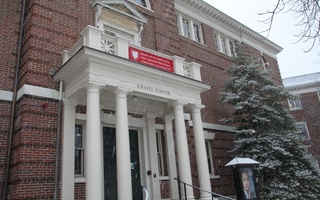In his memoir, “The Sun Does Shine,” Anthony Ray Hinton, a black man from rural Alabama who has been put on death row for crimes he did not commit, finds his most important source of strength in Scripture. After the 1985 robberies and murders of two fast food restaurant managers and the attempted murder of a third, Hinton himself becomes a victim—not of a serial killer on the loose, but of the criminal justice system in America which decides that he is guilty of these charges. Considering the fact that he was working as a custodian 15 miles away from where he allegedly tried to shoot a man in the head, the accusation is absurd. He “pray[s] for God to reveal the truth” knowing that it will be the ultimate source of liberation for him, citing John 8:32: “Then you will know the truth, and the truth will set you free.” Ultimately, however, Hinton finds that freedom from truth alone is difficult to achieve. Hinton’s solid voice in “The Sun Does Shine” gives the memoir a push-and-pull feel, mirroring the constant setbacks and advances on his road to liberation.
Born in 1955, Hinton comes of age at a turbulent time in American society, and his erudite depiction of what he remembers of his daily life in rural Alabama is both insightful and aggravating. He details growing up in the shadows of the Civil Rights movement, alluding to high-profile turning points like the 1963 16th Street Baptist Church bombing in Birmingham and the jailing of Martin Luther King, Jr. Alongside these historical moments are more personal scenes too small to have garnered as much attention, from the day-to-day reality of segregation in the South to the bombings of people’s houses. “People living on Dynamite hill [had] to hide in their bathtubs because bombs were being thrown into their houses,” he writes at one point.
By detailing the extent to which racism plays a role in his daily life, Hinton foreshadows the attitudes that will ultimately ensure his indictment. When he first arrives at the police station, officers immediately tell him that conviction is inevitable and give him five reasons why, starting with: “Number one, you’re black.” Hinton’s race, coupled with Hinton’s old enemy’s thirst for vengeance and a “constitutionally deficient” defense lawyer, is the chief reason he finds himself on death row. Hinton’s first-person account rings louder than a newspaper retelling his story. His narration imparts a valuable understanding of just how strongly racism is tied to America’s criminal justice institutions, more so than any retelling of the circumstances of his conviction ever could.
Nonetheless, Hinton finds the strength to not only survive while in prison, but to actively resist the institutional racism that has put him there in what is the most compelling aspect of the memoir: Time and time again, even after his motions for appeals fail and with no good lawyer in sight, Hinton refuses to be a victim. He seeks to fulfill the promise he repeatedly makes to his mother of a prompt homecoming. While in prison, Hinton even starts a book club, feeling like “someone had brought in contraband” since it is so forbidden. After more inadequate lawyers fail to free him from prison, however, Hinton meets “God’s best lawyer,” Bryan Stevenson from the Equal Justice Initiative in Montgomery, Alabama, who eventually helps pave the path to Hinton’s freedom after losing 30 years of life he will never get back. Hinton’s ability to speak about the injustices he faces with such poise and composure is his greatest gift. His ability to effectively articulate his infuriating experience in a level tone speaks to the character Hinton never let die.
Throughout the memoir, Hinton continuously questions the nature of his freedom: Does he ever truly attain it? Though everyone now knows the truth of his innocence, Hinton’s freedom has not come easily. By detailing his complicated relationship with the idea of it, Hinton shows the subjective nature of the word. When he works at the coal mine, “freedom” means being away from that “dark place” and standing in the sunshine. When he is in prison, Hinton finds “freedom” by daydreaming about adventures overseas and getting lost in works of fiction, if not in his fantasies about getting off death row. Now that he will no longer be executed, “freedom” once again means something different. Even though he sang “Thank God Almighty, I’m free at last” as he walked off the row, he admits that “I have my freedom, but in some ways, I am still locked down on the row.” The pervasive role that identity, memory, and loss play in his life forces him to take on a new struggle in the fight to fix America’s criminal justice system by abolishing the death penalty. For now, genuine freedom still has to wait.
Read more in Arts
Unpopular Opinion: It’s Not Country, You’re Just ClassistRecommended Articles
-
FREEDOM INDUSTRIES AND CARMICHAELTo the Editors of the CRIMSON: May I state at the outset the appreciation of the Freedom Industries staff for
-
Crimson Skiers to Compete In Race at Franconia NotchThe ski team leaves today for Franconia Notch, New Hampshire, where they will enter the Hocheberge Annual Down Hill Race
-
Ski Team Takes DartmouthHarvard's 15 man ski team captured the sixth annual Harvard-Dartmouth slalom by a margin of 1 minute, 43.2 seconds over
-
13 Members of Faculty Bid Farewell To Their Posts This June and AugustThirteen permanent University faculty appointees will wave good-bye to lecture platform and office this June and August. Among those retiring
-
 Angela Davis Donates Papers to Schlesinger Library
Angela Davis Donates Papers to Schlesinger Library














